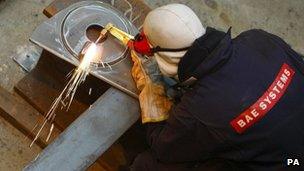Is the BAE/EADS merger a dead duck?
- Published
- comments

For all the flak thrown at the boards of BAE and EADS in recent days, they do not believe their plan to merge the huge defence and aviation companies is dead. But are they right?
Well-placed sources tell me that they are likely to decide tomorrow night to request a 14-day extension to the timetable for getting all the necessary ducks in a row - which is an essential pre-condition of them coming out of purdah and announcing the detailed terms of the marriage they seek.
But is it really worth it, in that those ducks seem to be the least herdable and most ornery of any quackers I've encountered?
In just the last few days, we learned that the German and French governments remain a long way from surrendering the kind of shareholder influence over the enlarged company that would persuade the British government to back the deal - and, perhaps more importantly, would also dissuade the US government from taking BAE off its list of privileged defence suppliers.
In simple terms, the deal cannot happen unless France and Germany both agree that they will never own more than 9% each of the enlarged group and that they will have no formal pact to act in concert.
For BAE, a positive sign is that the French, German and UK governments are having proper talks about this. And, for reasons that slightly elude me, BAE's senior people do not seem terribly worried that the French are refusing to agree this ceiling on its ownership and control.
Meanwhile 45 Tory MPs have written to the British prime minister expressing concern that the UK's industrial and national interests could be jeopardised by the tie-up.
And as a reminder that this is not just about politics but is also about the wealth of those who own BAE through their pension schemes and savings plans, BAE's largest shareholder, Invesco Perpetual, has put out a statement savaging both the putative strategic logic behind the deal and its financial implications.
Invesco, which is far and away BAE's most important owner with 13.3% of the company, warns that BAE's all-important US military revenues could be undermined and also that the likely terms of the deal with EADS undervalue the British company.
Is there really nobody apart from the boards of the two companies in love with the idea of this merger?
What is galling for the directors of BAE and EADS is that, under the takeover rules, they are banned from promoting the rationale for the deal until a formal offer has been put to shareholders. Which means that day after day all the noise about the transaction is of a relentlessly negative character.
And here is what may finally tip BAE's directors and their advisers into a realisation that the obstacles to the merger may be insuperable: the British prime minister and his cabinet are not as enthusiastic about the deal as they seemed to believe.
The attraction for the British government of the merger is that it might reduce the risk that one day EADS could decide to relocate the manufacture of wings for Airbuses away from the UK.
Airbus UK is a vital part of the country's hi-tech manufacturing capacity, supporting something like 140,000 jobs in Britain in total. And the government has long been uncomfortable that it is owned by EADS, because EADS is in turn 50.5% controlled by the French, German and Spanish governments, which are united by a concert-party agreement or ownership pact.
So if the merger of BAE and EADS was accompanied by a reduction of around a third in the direct investment of these governments and a tearing up of the ownership pact, then that would be seen by David Cameron as a big win for Britain.
But against that, I am told, is his concern that the merger would leave the French and German states with the ability to influence the biggest and most important engineering business in the UK, BAE - and could in theory make it harder to protect our military technology and secrets.
What is more, he is concerned that what he sees as the UK's vital military links with the US could be weakened by the europeanisation of BAE - which, as just one example, could damage British work on the Joint Strike Fighter programme.
All of which suggests that the crunching together of BAE and EADS may never move from being the beautiful dream of the two boards into hard reality.